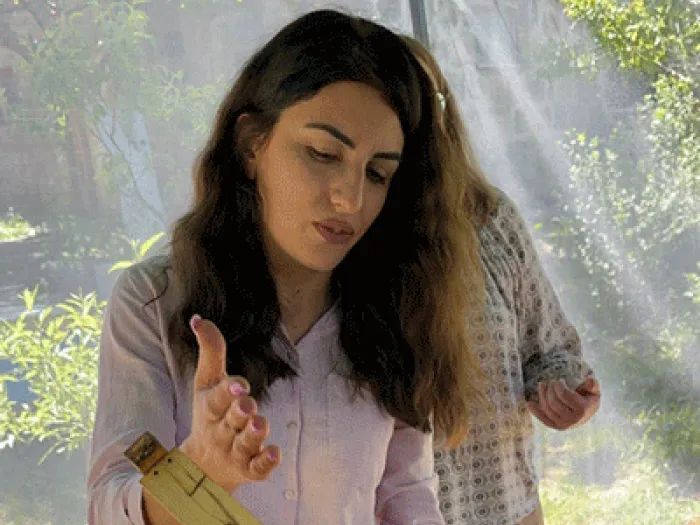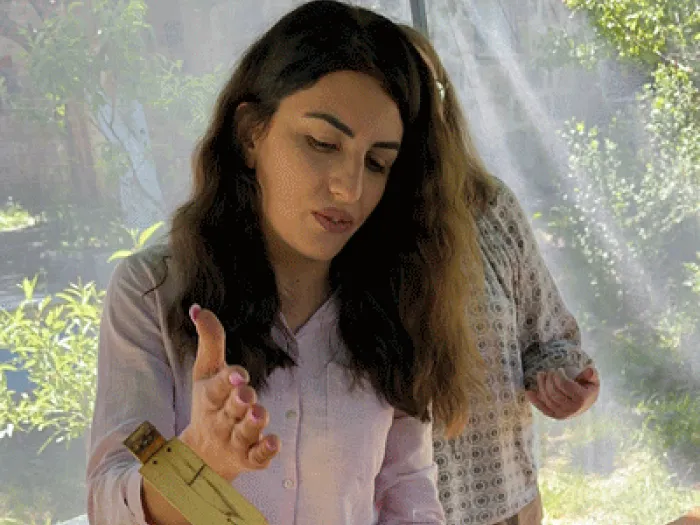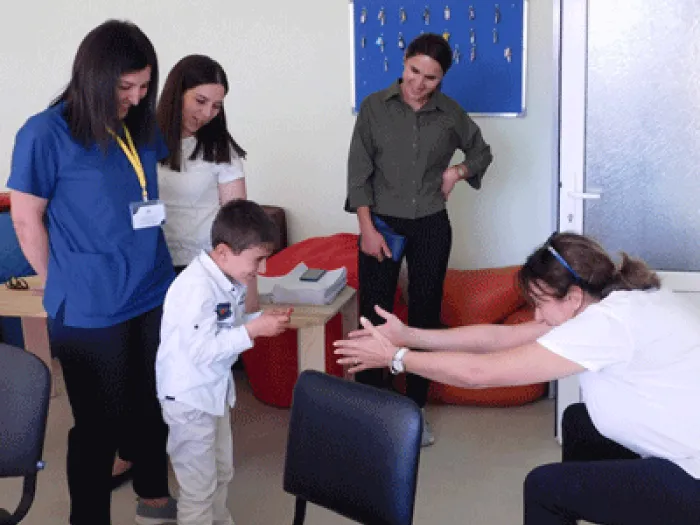Jinishian Memorial Program offers self-sufficiency and hope to Armenians
Study tours help relay impact of its programs to participants


Editor’s Note: This is the first in a series of stories and reflections on the Jinishian Memorial Program. The stories are told from the perspective of program staff and study tour participants.
LOUISVILLE — The Jinishian Memorial Program (JMP) was established in 1966 through an endowment from Vartan H. Jinishian and is administered by the Presbyterian Church (U.S.A.) to provide economic, social, and spiritual assistance to millions of Armenians in Syria, Lebanon, Turkey, Armenia, Georgia and other countries.
Its mission is fairly simple: help people transition from poverty and despair to self-sufficiency and hope. JMP offers that hope through relief efforts, economic development initiatives and spiritual uplift.
Recently, JMP offered a 10-day study tour for Presbyterians or anyone else interested in learning more about its work on the ground. The tour consisted of visits to major destinations, historical and cultural monuments, and cultural events like concerts and festivals. Perhaps more importantly, the tour also included visits to JMP’s development projects so that participants could learn more about the impact its programs have on the target audience. In a series of articles that will be posted by Presbyterian News Service over the next few weeks, you can learn first-hand from tour participants about the impact JMP has on the people it serves.

JMP’s executive director, Eliza Minasyan (EM), reflected on JMP and shared her insight with the Presbyterian News Service (PNS) on what makes JMP unique, the obstacles faced by the organization, and the impact of their study tours.
PNS: Share with our readers who might not be familiar with the Jinishian Memorial Program: what it is, who does it serve, and its vision.
EM: JMP has provided economic, social, and spiritual assistance to more than a million Armenians throughout Middle East and Europe since its inception in the 1960s. Our mission is to help people transition from poverty and despair to self-sufficiency and hope through relief, development, and spiritual uplift. Christian communities are integrated and empowered to sustain a dignified life. We have no political affiliation and are committed to working ecumenically with Christian churches to fulfill our mission.
PNS: What are JMP’s strategic priorities?
EM: As I mentioned, community health, education and spiritual uplift are a few of our key strategic components. We also prioritize emergency relief and social assistance, community development and economic empowerment. We strongly believe that our support should empower beneficiaries to address their own needs and community issues, rather than merely providing them with means to survive, which can create dependency on external help. Instead, we aim to empower people to support their families and the entire community. This is why our vision emphasizes the importance of sustaining a dignified life.
PNS: You provide services to a large group of people across the Middle East and Europe with varying needs and unique situations. How are you able to focus to accomplish your objectives?
EM: We utilize local teams to reach more than 50,000 people in need each year across various regions. Using local resources allows us to respond swiftly in changing conditions with compassion, innovation and integrity, and bring self-sufficiency and hope to areas affected by poverty and despair. For example, we’re able to renew faith and promise of post-communist Armenia through long-term, community-based social and economic development. We care for vulnerable Christian minorities trapped in Syria’s relentless violence, scarcity and inflation, and help the increasingly strained population in Lebanon during times of devastating economic and political crises. In a spirit of Christian unity, we serve the community as a whole — socially, economically and spiritually.
PNS: What is the rationale behind offering study tours as a way to increase your program’s impact where you have a presence?
EM: Armenians face a variety of unique challenges, ranging from economic hardships to political instability. Despite these difficulties, the country and its people are full of positive energy, characterized by cheer and hope, creativity and talent, courage and enthusiasm. Since 2009, our study tours, including the one we completed in 2024 and the upcoming one in 2025, aim to address and highlight the impact of these issues by:
- Showcasing our projects — we highlight our initiatives and their direct benefits to local communities, demonstrating tangible improvements in the quality of life.
- Providing an immersive experience — by offering participants a deep and engaging experience, it allows them to understand the complexities of Armenian life and the resilience of its people.
- Facilitating direct interactions — we enable direct engagement with locals, including farmers, health professionals, students, and young entrepreneurs, to foster mutual understanding and support.

We limit our groups to nine participants to ensure a personalized and flexible experience. The small group size fosters a family-like atmosphere where participants can adjust the agenda as needed to suit their interests. Participants come from diverse backgrounds and professions, but by the end of the tour, they often feel like a close-knit family, reluctant to part ways. They discover Armenia’s ancient Christian heritage, vibrant culture, and the ongoing faith and resilience of its people.
PNS: What are the primary goals of the study tour?
EM: The primary goals of our study tours are to learn about Armenia through the eyes of local people; understand its past, present and aspirations for the future; and experience local tradition, hospitality, humor and culinary delights. Participants learn about our development projects and often appreciate and build upon what they have in their own life and are inspired by the resilience, creativity and dynamism of the Armenian people. They often continue to stay involved and connect with us. Most of them leave Armenia with a profound appreciation for its people and a renewed motivation to make a positive impact in their own communities. One participant encapsulated the experience perfectly: “All I can say is, go… and let the people, their faith and the landscapes draw you into their embrace."
PNS: Final question: what do you want readers to know about JMP the organization?
EM: I have been with JMP for nearly 20 years, beginning as the director of the Armenia country program. What I like most about serving in JMP is the ability to provide immediate, necessary support or interventions developed with locals and owned by the beneficiaries. With our local teams, our field experience is extensive, and every single project aims to empower individuals alongside providing material support. Our organization operates with a relatively flat hierarchy, allowing us to be flexible and quick to adjust and respond. We ensure that we address the most critical needs in the most efficient way possible.

While we may not always focus on showcasing our work, we dedicate our resources to the core purpose of empowering individuals to solve their problems and strengthening their communities as a whole. Leading this kind of organization and work is incredibly inspiring; it allows me to witness firsthand the positive changes and profound impacts we make in the lives of those we serve.
To learn more about the Jinishian program, visit the website or sign up to receive Jinishian’s quarterly newsletter. Stay tuned to Presbyterian News Service for upcoming articles written by JMP 2024 study tour participants to learn how JMP’s assistance impacts for program recipients.
Click here for information about the 2025 JMP Study Tour.
You may freely reuse and distribute this article in its entirety for non-commercial purposes in any medium. Please include author attribution, photography credits, and a link to the original article. This work is licensed under a Creative Commons Attribution-NonCommercial-NoDeratives 4.0 International License.




